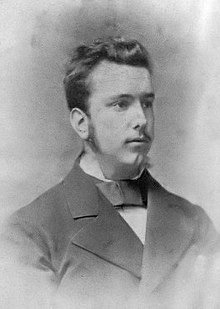Paul Wolfskehl
Paul Friedrich Wolfskehl (born June 30, 1856 in Darmstadt ; † September 13, 1906 there ) was a German doctor and mathematician, known as the founder of the Wolfskehl Prize .
Life
Wolfskehl was the youngest of two sons of the Jewish banker Joseph Carl Theodor Wolfskehl (1814–1863) and Johanna Wolfskehl (1820–1894), daughter of the Stuttgart court banker Nathan Wolf Kaulla (1785–1838). While his older brother, the lawyer Otto Wolfskehl (1841-1907), took over his father's bank (which existed from around 1800 to 1881), Wolfskehl studied medicine in Leipzig , Tübingen and Heidelberg from 1875 , where he earned his doctorate in ophthalmology in 1880 . At around the same time, the first symptoms of multiple sclerosis appeared . Wolfskehl decided to give up the medical profession and began to study mathematics in Bonn and from 1881 at the Friedrich Wilhelms University in Berlin, where he heard, among other things, number theory from Ernst Eduard Kummer . Wolfskehl, who already had a doctorate in medicine, did not write a mathematical dissertation. In 1887 he allegedly completed his habilitation at the TH Darmstadt , where he also gave lectures on number theory. However, this is hardly conceivable because the university did not have the right to award doctorates until 1899. The invitation to give lectures was possibly a thank you from the university to the Wolfskehl family, who had done a lot for the university. Around 1890 he was paralyzed due to his illness and could not continue his lectures, but continued to publish some short mathematical papers. In 1903 he agreed to a family-arranged marriage, but the marriage was unhappy. In 1905 he bequeathed 100,000 gold marks, which he handed over to the administration of the Göttingen Academy of Sciences , as prize money for those who proved the Fermat conjecture . The award was officially announced by the Academy in 1908. Allegedly, Wolfskehl had tried in vain during his studies and afterwards to solve the Fermat conjecture, which was also the starting point of the investigations into the circular divisions of his teacher Kummer, who made important advances in the Fermat problem.
The Wolfskehl Prize was awarded to Andrew Wiles in 1997, ten years before it expired (and was worth 75,000 DM at the time).
The writer and translator Karl Wolfskehl was the son of Paul Wolfskehl's brother Otto, i.e. his nephew.
Web links
Individual evidence
- ↑ Barner could not find a habilitation thesis and holds the work on algebraic number theory by Wolfskehl (Wolfskehl "Proof that the second factor of the class number for the numbers formed from the 11th and 13th root unit is 1", Journal für Reine und Angewandte Mathematik, Vol. 99, 1886, pp. 173-178), which is mentioned in David Hilbert's number report , is not sufficient for a habilitation
- ↑ Wolfskehl's brother Otto practically saved the later university from being closed or relocated to Gießen in 1875
| personal data | |
|---|---|
| SURNAME | Wolfskehl, Paul |
| ALTERNATIVE NAMES | Wolfskehl, Paul Friedrich (full name) |
| BRIEF DESCRIPTION | German doctor and mathematician, founder of the Wolfskehl Prize |
| DATE OF BIRTH | June 30, 1856 |
| PLACE OF BIRTH | Darmstadt |
| DATE OF DEATH | September 13, 1906 |
| Place of death | Darmstadt |
